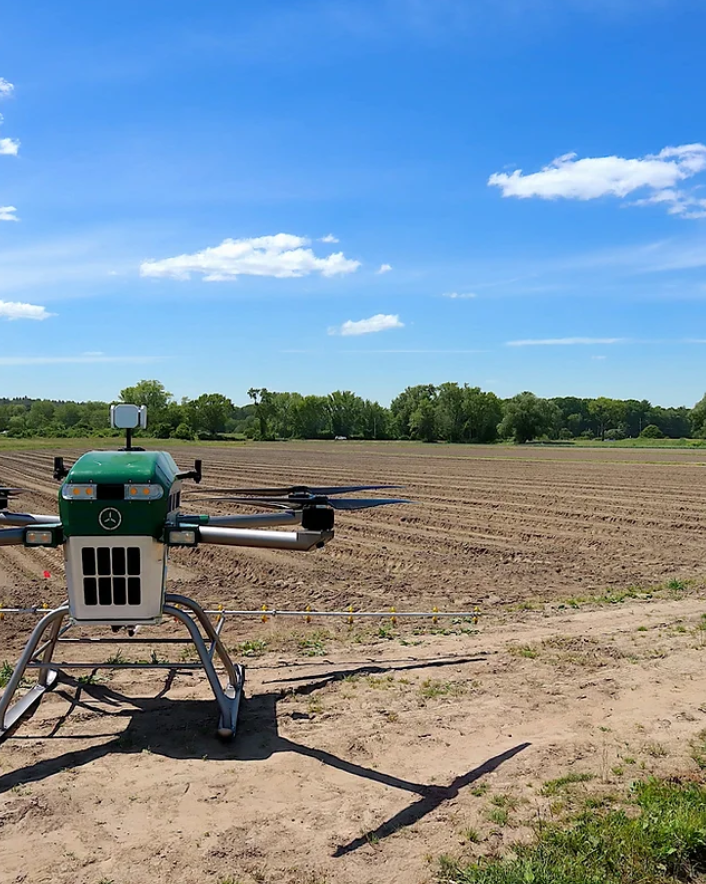The agricultural chemicals producer is widening its investment remit, looking at everything from fintech for farmers and soil health.

“We know the future of crop protection is not using more chemicals, it’s using less chemicals,” says Mark Brooks, head of FMC Ventures. “FMC is a chemicals company. So, what does that mean for the future of FMC, for the future of crop protection?”
As things stand, 130-year-old US company produces a range of crop protection products that includes herbicides, insecticides and fungicides, as well as micronutrients and seed treatments to help plants grow. But its corporate investment fund is already planning for the next stage of agriculture.
“We want to invest in technologies that help a farmer be more profitable, sustainable, productive and efficient,” Brooks says.
“Maybe that means we invest in things like robotics, automation, drones, precision spraying technologies or, ultimately, methods of using a lower volume of chemical but getting the same outcome or a better outcome because there is more precision, it’s better targeted and more data driven.”
“The future of crop protection is about marrying synthetic chemistries with digital technologies”
The unit currently has five companies in a portfolio that includes wireless sensor provider Scanit and crop-monitoring drone developer Guardian Agriculture, but it is preparing to branch out even more widely.
“The future of crop protection we see is about marrying synthetic chemistries with digital technologies,” Brooks says. “But there is also a brand new space, the biologics space, which is opening up. Using microbes and living organisms as a way to help plants be more resistant to disease and pest pressures. We’re investing in that space as well.
“Agricultural fintech is a big area for us. As a way for farmers to get access to credit and lending, reducing the economic friction for them to buy and sell their output. There’s a lot of stuff there that goes way beyond chemistry.”
The rebirth of a CVC unit

FMC Ventures was launched in mid-2020 with a team of three under the leadership of Amar Singh, but Brooks (pictured) came onboard as managing director last month, in effect to relaunch the unit. He currently is FMC Ventures, but an associate is coming onboard in January and he is recruiting for a principal level position (if you know anyone in your network – he’s open to referrals).
Before joining FMC, Brooks spent over two years as an investment manager at agribusiness Syngenta’s venture arm. FMC is roughly 20% the size of Syngenta, and in theory the more compact size of the company makes it easier to form internal networks which can then feed information back to individual business units.
“What attracted me was smaller size – easier to navigate and get things done from my personal perspective,” Brooks says. “But it was also a personal opportunity to head and lead the ventures team and function at FMC, which was an opportunity that definitely resonated with me.”
The unit invests up to series B, typically providing a base of about $250,000 at seed stage up to $3m or $4m for larger rounds. The cash comes off FMC’s balance sheet and while it does have to seek VC-size returns, the key mandate from the CEO is to invest in game changers, innovations that reach far beyond FMC’s core business.
Why every investment needs a climate change angle
While ‘game changers’ largely refers to specific technologies, the biggest challenge in the industry is climate change. Agriculture is an ‘enormous part’ of addressing climate change, Brooks explains, and it is a factor in every deal FMC Ventures considers.

“I would argue that every investment that we have made and will make will have a direct line to carbon or climate change, or some ESG (environmental, social or governmental) angle to it, because it is so intertwined with climate change,” he says.
“Five years ago, if you’d talked about climate change investing, climate tech or whatever, people would be talking about the energy sector or transportation,” Brooks says.
“Today, agriculture is a front and centre protagonist in that investment thesis around climate because of the enormous carbon footprint the agricultural supply chain has on the planet, and because of the ability of plants – row crop corn, soybeans, that kind of thing – and the soil to absorb and sequester carbon.”
“The whole value chain from when a seed gets planted to when it turns up at your supermarket, restaurant or refrigerator – there’s a lot of stuff in between that can and will be done to address the climate change solution story.”
Soils: The next frontier in agtech?
Robotics, chemicals and fintech all form part of the modern agtech sector, as they all address the pain points for farmers. Labour shortages are fuelling robotics technology while biological fungicides and insecticides could help them overcome diseases and insects becoming resistant to chemicals.
One area which Brooks is particularly excited about is soil.
“We don’t know much about soils,” he says. “There is a lot going on in the soil that affects a plant’s health, its vigour and its yield, and for 75 years all research has gone into nutrition of the soil – how much nitrogen or phosphorus is in the soil. We have a great understanding of that but we don’t know much about the soil beyond that.
“There are living organisms and microbes and microscopic bugs crawling around there that are very important to soil quality. But we don’t know much about that stuff yet, so I think the next frontier for farmers to spend time, money and energy on is going to be soils.
“There is a lot of innovation going on to understand the soil and the microbiome, and to leverage that knowledge to improve plant health outcomes without having to use as much chemistry. And I think that’s a great thing for the planet, for soil quality and farmers.”
“We want to invest in innovations that are well beyond the core of what FMC is today”
In addition to capital, FMC can offer portfolio companies access to their R&D, commercial and regulatory expertise as well as access to its customers. But while building links to internal business units is important to Brooks, the key target will ultimately be disruption.
“And that means we want to invest in innovations that are well beyond the core of what FMC is today. Investing in things that could be strategic for FMC within five years or 10 years or beyond.
“So, that strategic linkage has to be there, but it also has to be done in such a way that we stretch the core into new directions and make that core uncomfortable. That’s why we exist and that’s the purpose of FMC Ventures.”









